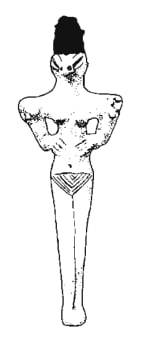Who are the Anunnaki?
The Anunnaki (the short form of the term in Sumerian is Anunna) were a group of gods known from religious texts and myths from ancient Mesopotamia (namely, the Sumerians, Akkadians, Babylonians). In popular contemporary culture and shows like Ancient Aliens, the Anunnaki are considered by some to be ancient aliens who visited earth, or the Nephilim of the Bible. People who promote this idea, such as the late Zecharia Sitchin, asserted that the term Anunnaki meant “they who from heaven came,” suggesting an extraterrestrial origin.

How did these recent ideas come about? Are there ancient primary sources we can read and study to learn who the Anunnaki were?
Who are the Anunnaki? Mesopotamian Gods
There are more than 100 textual references to the Anunnaki in ancient Mesopotamian texts (Heiser). Depending on the document, its genre, and the era of its composition, the Anunnaki are either described as an important, high-ranking group of gods or a low-ranking group consigned to the Sumerian underworld realm of the dead (Katz; see the Sumerian text, Inana's Descent into the Netherworld). This shift occurred after the Old Babylonian period (ca. 2000-1500 BC). Existing Mesopotamian texts do not answer the question of why this portrayal changed or why the Anunnaki were apparently demoted from high status.
Mesopotamian texts also reveal that the term Anunnaki could be used to describe the members of a pantheon of a particular city state, e.g., “the Anunna of Eridu” or “the Anunna of Lagash” (Falkenstein, Katz). The Babylonian Creation Story (Enūma elish) describes Marduk assigning 300 Anunna gods for duty in the heavens, and the same number for duty in the netherworld, giving a total of 600 Anunna gods. This text is chronologically late, so it is unclear how the Sumerians, for example, would have numbered the Anunnaki (if they bothered to do so at all).
The University of Pennsylvania has been a center for the study of Sumerian lexicography for several decades. The initial volume of the Pennsylvania Sumerian Dictionary (PSD) included their research on the term Anunnaki. It does not mean, as ancient alien theorists argue, “they who from heaven came.” Rather, usage of the term in Mesopotamian texts shows it means “princely seed”, “high born” or “noble.” That the term is used for people shows this meaning to be coherent. As a group of gods created by other gods, the concept of “princely seed” or being “high born” makes sense. It is likewise sensible for humans of royal birth or born to parents of high social status to be called Anunnaki.
As the Pennsylvania Mesopotamian Gods and Goddesses Project notes, “There are no known depictions of Anunna or Anunnaku, only of individual deities.” The same research project observes that it is doubtful that the Anunnaki were ever worshipped. To date there are no secure references to their worship, except for “new textual evidence from the Ur III period, in which it appears that offerings were made to Anunna.”
Who are the Anunnaki? Reptilian Aliens?
 Figure 1
Figure 1
According to the late Zecharia Sitchin, the Anunnaki are extraterrestrials who came to earth from their home planet Nibiru, a planet beyond Pluto whose orbit brings it into our solar system every 3,600 years. Sitchin’s writings have sold tens of millions of copies and been translated into more than two dozen languages. Sitchin’s views often take center stage on the television show Ancient Aliens. Researchers following Sitchin’s ideas subsequently argued that the serpentine/reptilian figures (Figure 1) from the prehistoric Ubaid culture in Mesopotamia are the Anunnaki.
A search of the Electronic Text Corpus of Sumerian Literature (ETCSL) maintained by the University of Oxford reveals that there are no cuneiform sources that associate the Anunnaki with Nibiru in any way or that have the Anunnaki coming from any celestial body. There is also no cuneiform evidence that Nibiru was thought to be a planet beyond Pluto or that it enters our solar system every 3,600 years. Nor are there any cuneiform primary sources that describe the appearance of the Anunnaki. Since the Ubaid culture was prehistoric, there is no writing on any Ubaid figurine (Figure 1) to associate it with the Anunnaki, nor were the figurines found with any inscribed material to indicate they were the Anunnaki.
The Sumerian and Mesopotamian sources therefore do not support in a single instance any of the contemporary claims about the Anunnaki being reptilian aliens from Nibiru who visited earth long ago.
Resources:
Electronic Text Corpus of Sumerian Literature (ETCSL)
Pennsylvania Sumerian Dictionary Project
M. Heiser, “Anunnaki” at Sitchin is Wrong website
“Anunna(Anunnaku,Anunnaki),” University of Pennsylvania Ancient Mesopotamian Gods and Goddesses
A. Falkenstein, 1965. "Die Anunna in der sumerischen Überlieferung." In H. Güterbock and T. Jacobsen (eds.) Studies in Honor of Benno Landsberger on his Seventy-Fifth Birthday, April 21, 1965. Assyriological Studies, 16, pp. 127-140. Chicago: Oriental Institute Press
B. Kienast, 1965. 'Igigū and Anunnakkū nach den akkadischen Quellen.' In H. Güterbock and T. Jacobsen (eds.), Studies in Honor of Benno Landsberger on his Seventy-Fifth Birthday, April 21, 1965. Assyriological Studies, 16, pp. 141-158. Chicago: Oriental Institute Press.
Download free PDF from the Oriental Institute, University of Chicago
D.O. Edzard, 1976-80. "[Igigū], Anunna und. A. Nach sumerischen Quellen." Reallexikon der Assyriologie und Vorderasiatischen Archāologie 5, pp. 37-40. Berlin: de Gruyter
D. Katz, 2003. The Image of the Netherworld in the Sumerian Sources. Bethesda, MD: CDL Press
Aurelie Daems, “A Snake in the Grass: Reassessing the ever-intriguing Ophidian figurines." Beyond the Ubaid: Transformation and integration in the late prehistoric societies of the Middle East. Vol. 63. The Oriental Institute of Chicago, 2010. 149-161. Available as free PDF
What is your response?


